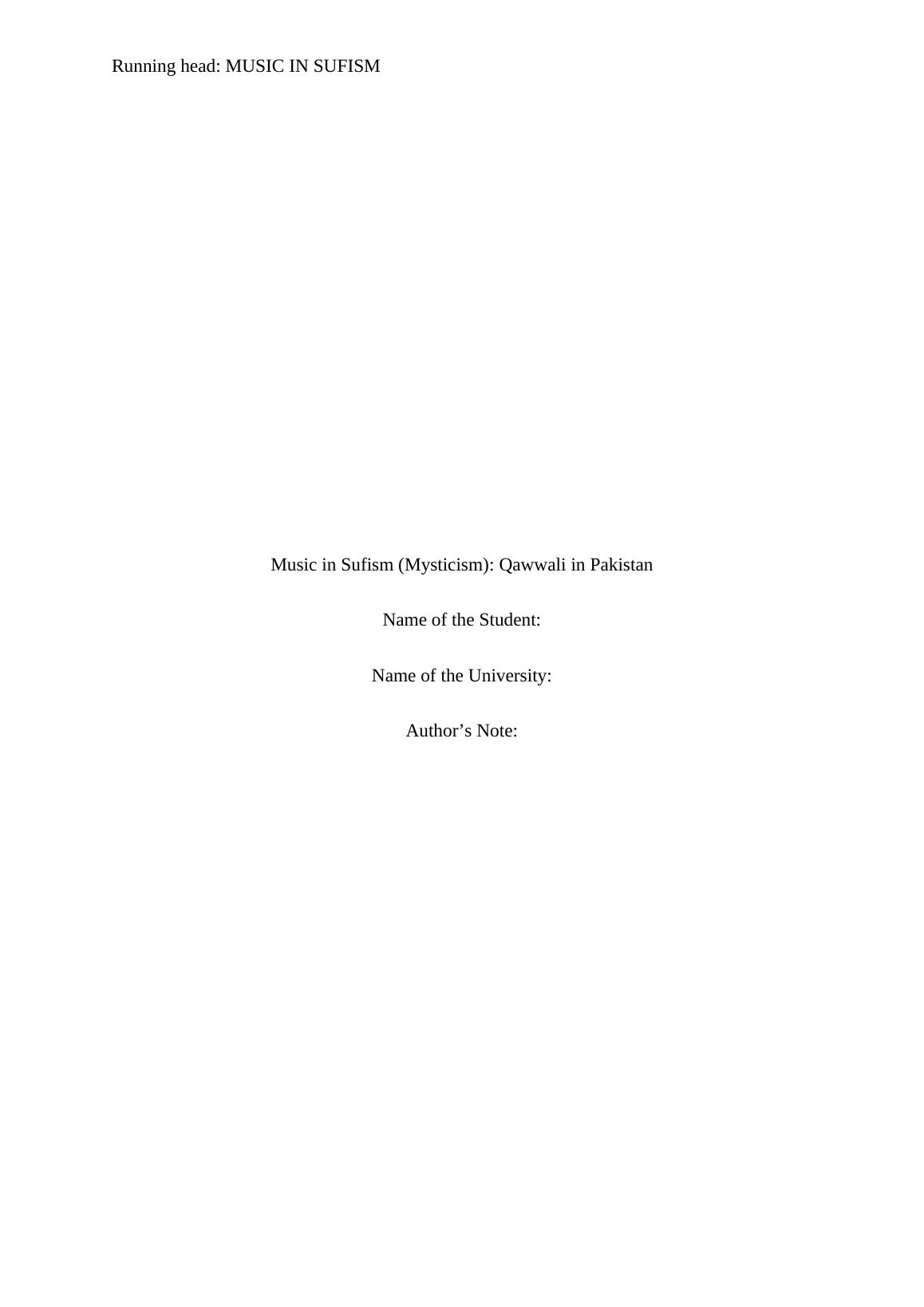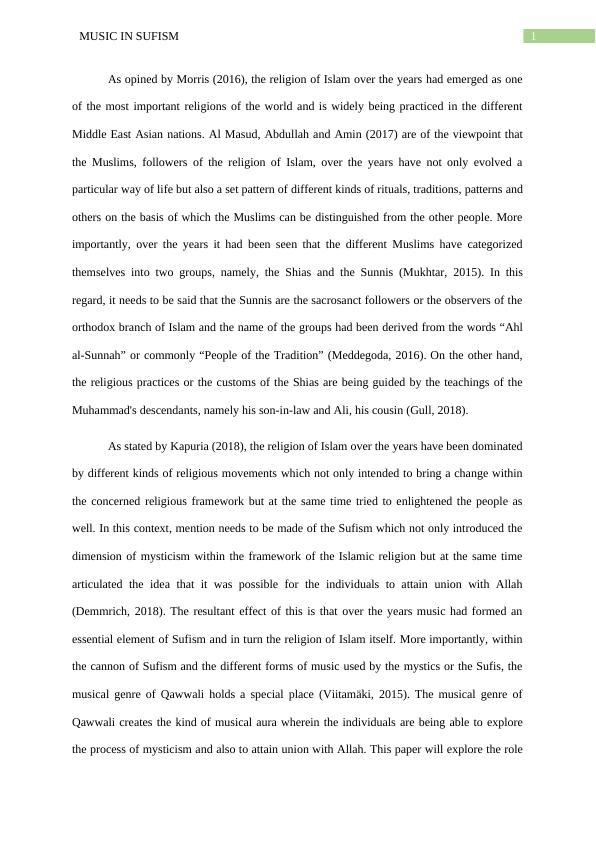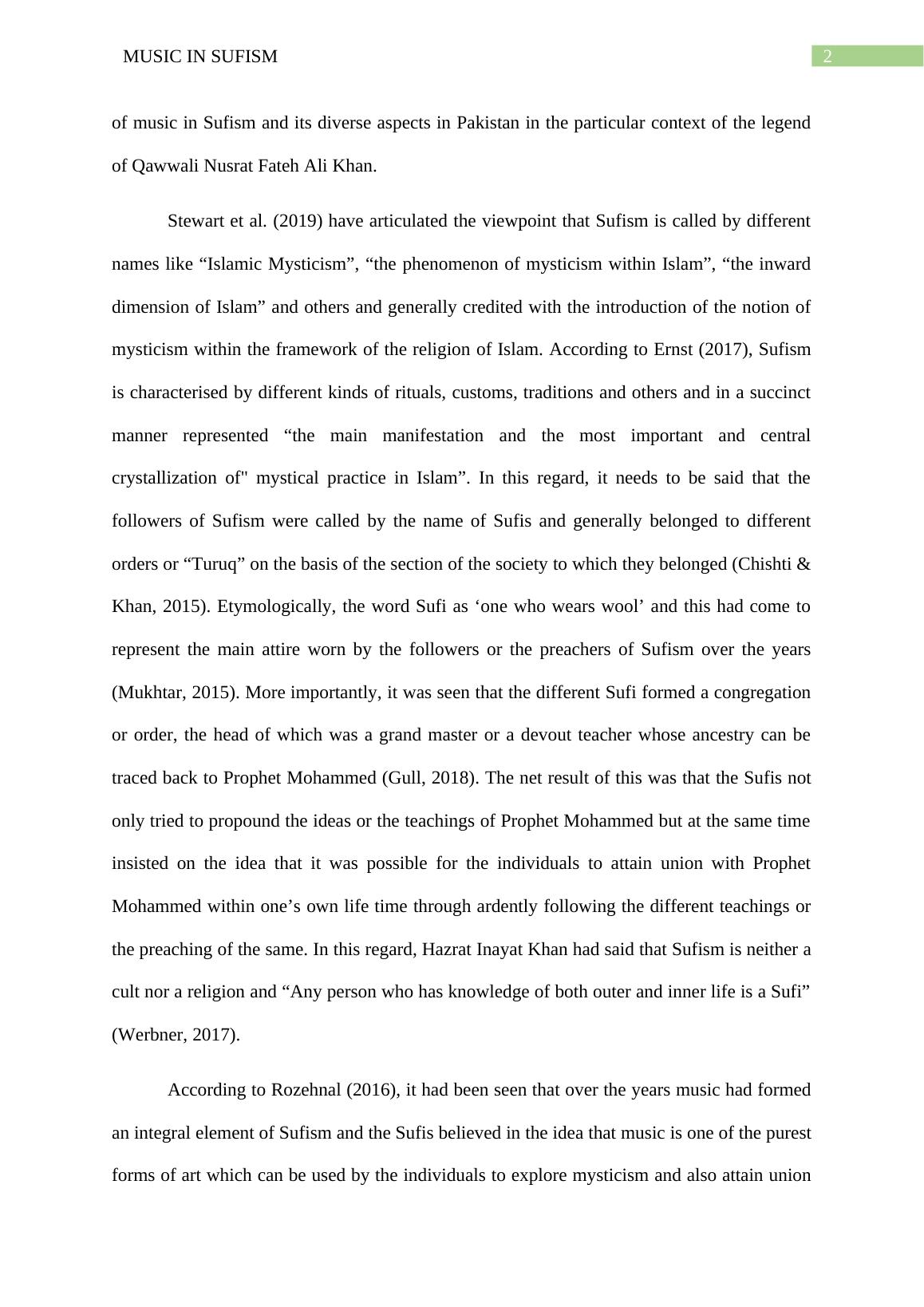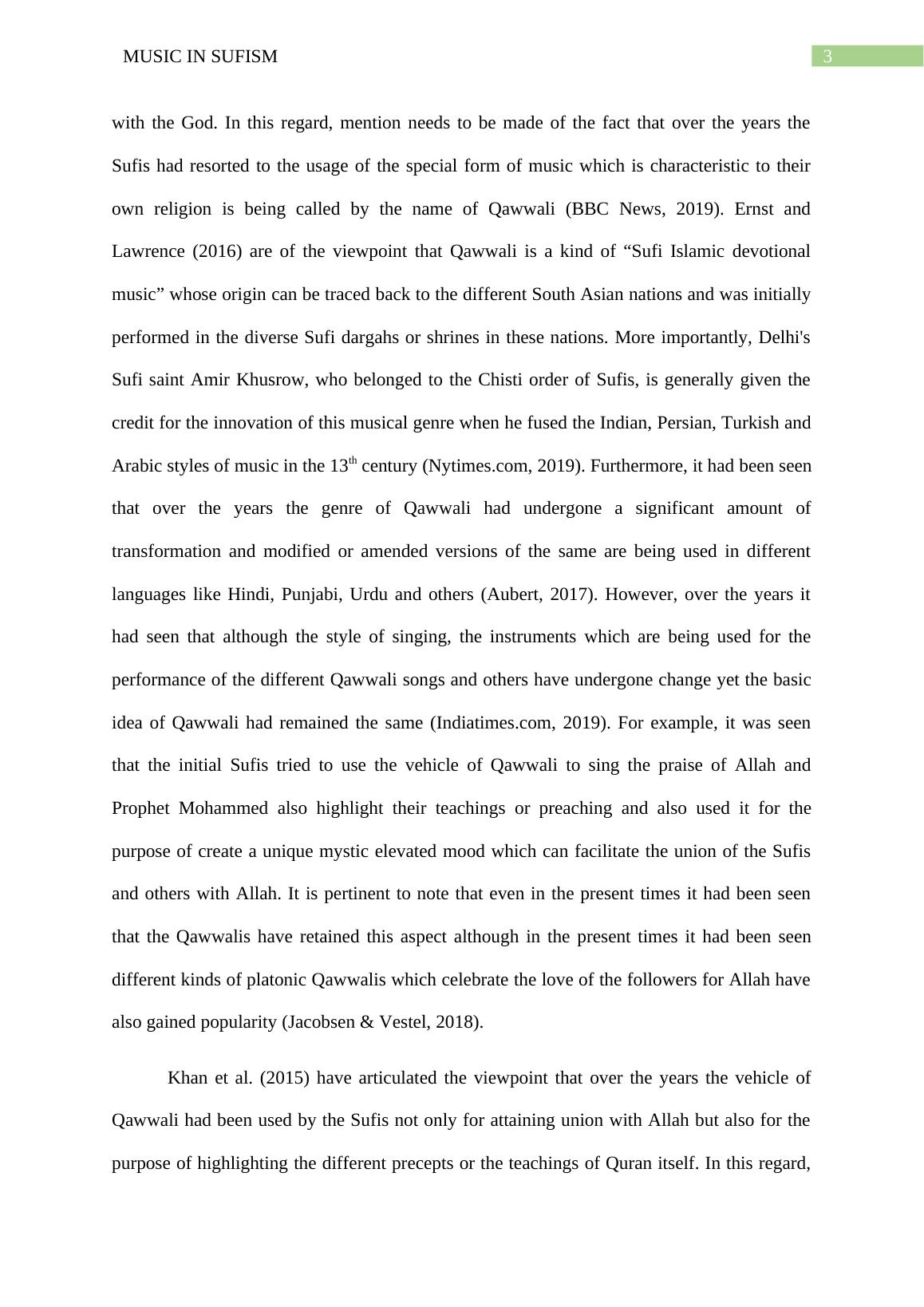Music in Sufism: Qawwali in Pakistan
Added on 2023-01-19
15 Pages5213 Words84 Views
Running head: MUSIC IN SUFISM
Music in Sufism (Mysticism): Qawwali in Pakistan
Name of the Student:
Name of the University:
Author’s Note:
Music in Sufism (Mysticism): Qawwali in Pakistan
Name of the Student:
Name of the University:
Author’s Note:

1MUSIC IN SUFISM
As opined by Morris (2016), the religion of Islam over the years had emerged as one
of the most important religions of the world and is widely being practiced in the different
Middle East Asian nations. Al Masud, Abdullah and Amin (2017) are of the viewpoint that
the Muslims, followers of the religion of Islam, over the years have not only evolved a
particular way of life but also a set pattern of different kinds of rituals, traditions, patterns and
others on the basis of which the Muslims can be distinguished from the other people. More
importantly, over the years it had been seen that the different Muslims have categorized
themselves into two groups, namely, the Shias and the Sunnis (Mukhtar, 2015). In this
regard, it needs to be said that the Sunnis are the sacrosanct followers or the observers of the
orthodox branch of Islam and the name of the groups had been derived from the words “Ahl
al-Sunnah” or commonly “People of the Tradition” (Meddegoda, 2016). On the other hand,
the religious practices or the customs of the Shias are being guided by the teachings of the
Muhammad's descendants, namely his son-in-law and Ali, his cousin (Gull, 2018).
As stated by Kapuria (2018), the religion of Islam over the years have been dominated
by different kinds of religious movements which not only intended to bring a change within
the concerned religious framework but at the same time tried to enlightened the people as
well. In this context, mention needs to be made of the Sufism which not only introduced the
dimension of mysticism within the framework of the Islamic religion but at the same time
articulated the idea that it was possible for the individuals to attain union with Allah
(Demmrich, 2018). The resultant effect of this is that over the years music had formed an
essential element of Sufism and in turn the religion of Islam itself. More importantly, within
the cannon of Sufism and the different forms of music used by the mystics or the Sufis, the
musical genre of Qawwali holds a special place (Viitamäki, 2015). The musical genre of
Qawwali creates the kind of musical aura wherein the individuals are being able to explore
the process of mysticism and also to attain union with Allah. This paper will explore the role
As opined by Morris (2016), the religion of Islam over the years had emerged as one
of the most important religions of the world and is widely being practiced in the different
Middle East Asian nations. Al Masud, Abdullah and Amin (2017) are of the viewpoint that
the Muslims, followers of the religion of Islam, over the years have not only evolved a
particular way of life but also a set pattern of different kinds of rituals, traditions, patterns and
others on the basis of which the Muslims can be distinguished from the other people. More
importantly, over the years it had been seen that the different Muslims have categorized
themselves into two groups, namely, the Shias and the Sunnis (Mukhtar, 2015). In this
regard, it needs to be said that the Sunnis are the sacrosanct followers or the observers of the
orthodox branch of Islam and the name of the groups had been derived from the words “Ahl
al-Sunnah” or commonly “People of the Tradition” (Meddegoda, 2016). On the other hand,
the religious practices or the customs of the Shias are being guided by the teachings of the
Muhammad's descendants, namely his son-in-law and Ali, his cousin (Gull, 2018).
As stated by Kapuria (2018), the religion of Islam over the years have been dominated
by different kinds of religious movements which not only intended to bring a change within
the concerned religious framework but at the same time tried to enlightened the people as
well. In this context, mention needs to be made of the Sufism which not only introduced the
dimension of mysticism within the framework of the Islamic religion but at the same time
articulated the idea that it was possible for the individuals to attain union with Allah
(Demmrich, 2018). The resultant effect of this is that over the years music had formed an
essential element of Sufism and in turn the religion of Islam itself. More importantly, within
the cannon of Sufism and the different forms of music used by the mystics or the Sufis, the
musical genre of Qawwali holds a special place (Viitamäki, 2015). The musical genre of
Qawwali creates the kind of musical aura wherein the individuals are being able to explore
the process of mysticism and also to attain union with Allah. This paper will explore the role

2MUSIC IN SUFISM
of music in Sufism and its diverse aspects in Pakistan in the particular context of the legend
of Qawwali Nusrat Fateh Ali Khan.
Stewart et al. (2019) have articulated the viewpoint that Sufism is called by different
names like “Islamic Mysticism”, “the phenomenon of mysticism within Islam”, “the inward
dimension of Islam” and others and generally credited with the introduction of the notion of
mysticism within the framework of the religion of Islam. According to Ernst (2017), Sufism
is characterised by different kinds of rituals, customs, traditions and others and in a succinct
manner represented “the main manifestation and the most important and central
crystallization of" mystical practice in Islam”. In this regard, it needs to be said that the
followers of Sufism were called by the name of Sufis and generally belonged to different
orders or “Turuq” on the basis of the section of the society to which they belonged (Chishti &
Khan, 2015). Etymologically, the word Sufi as ‘one who wears wool’ and this had come to
represent the main attire worn by the followers or the preachers of Sufism over the years
(Mukhtar, 2015). More importantly, it was seen that the different Sufi formed a congregation
or order, the head of which was a grand master or a devout teacher whose ancestry can be
traced back to Prophet Mohammed (Gull, 2018). The net result of this was that the Sufis not
only tried to propound the ideas or the teachings of Prophet Mohammed but at the same time
insisted on the idea that it was possible for the individuals to attain union with Prophet
Mohammed within one’s own life time through ardently following the different teachings or
the preaching of the same. In this regard, Hazrat Inayat Khan had said that Sufism is neither a
cult nor a religion and “Any person who has knowledge of both outer and inner life is a Sufi”
(Werbner, 2017).
According to Rozehnal (2016), it had been seen that over the years music had formed
an integral element of Sufism and the Sufis believed in the idea that music is one of the purest
forms of art which can be used by the individuals to explore mysticism and also attain union
of music in Sufism and its diverse aspects in Pakistan in the particular context of the legend
of Qawwali Nusrat Fateh Ali Khan.
Stewart et al. (2019) have articulated the viewpoint that Sufism is called by different
names like “Islamic Mysticism”, “the phenomenon of mysticism within Islam”, “the inward
dimension of Islam” and others and generally credited with the introduction of the notion of
mysticism within the framework of the religion of Islam. According to Ernst (2017), Sufism
is characterised by different kinds of rituals, customs, traditions and others and in a succinct
manner represented “the main manifestation and the most important and central
crystallization of" mystical practice in Islam”. In this regard, it needs to be said that the
followers of Sufism were called by the name of Sufis and generally belonged to different
orders or “Turuq” on the basis of the section of the society to which they belonged (Chishti &
Khan, 2015). Etymologically, the word Sufi as ‘one who wears wool’ and this had come to
represent the main attire worn by the followers or the preachers of Sufism over the years
(Mukhtar, 2015). More importantly, it was seen that the different Sufi formed a congregation
or order, the head of which was a grand master or a devout teacher whose ancestry can be
traced back to Prophet Mohammed (Gull, 2018). The net result of this was that the Sufis not
only tried to propound the ideas or the teachings of Prophet Mohammed but at the same time
insisted on the idea that it was possible for the individuals to attain union with Prophet
Mohammed within one’s own life time through ardently following the different teachings or
the preaching of the same. In this regard, Hazrat Inayat Khan had said that Sufism is neither a
cult nor a religion and “Any person who has knowledge of both outer and inner life is a Sufi”
(Werbner, 2017).
According to Rozehnal (2016), it had been seen that over the years music had formed
an integral element of Sufism and the Sufis believed in the idea that music is one of the purest
forms of art which can be used by the individuals to explore mysticism and also attain union

3MUSIC IN SUFISM
with the God. In this regard, mention needs to be made of the fact that over the years the
Sufis had resorted to the usage of the special form of music which is characteristic to their
own religion is being called by the name of Qawwali (BBC News, 2019). Ernst and
Lawrence (2016) are of the viewpoint that Qawwali is a kind of “Sufi Islamic devotional
music” whose origin can be traced back to the different South Asian nations and was initially
performed in the diverse Sufi dargahs or shrines in these nations. More importantly, Delhi's
Sufi saint Amir Khusrow, who belonged to the Chisti order of Sufis, is generally given the
credit for the innovation of this musical genre when he fused the Indian, Persian, Turkish and
Arabic styles of music in the 13th century (Nytimes.com, 2019). Furthermore, it had been seen
that over the years the genre of Qawwali had undergone a significant amount of
transformation and modified or amended versions of the same are being used in different
languages like Hindi, Punjabi, Urdu and others (Aubert, 2017). However, over the years it
had seen that although the style of singing, the instruments which are being used for the
performance of the different Qawwali songs and others have undergone change yet the basic
idea of Qawwali had remained the same (Indiatimes.com, 2019). For example, it was seen
that the initial Sufis tried to use the vehicle of Qawwali to sing the praise of Allah and
Prophet Mohammed also highlight their teachings or preaching and also used it for the
purpose of create a unique mystic elevated mood which can facilitate the union of the Sufis
and others with Allah. It is pertinent to note that even in the present times it had been seen
that the Qawwalis have retained this aspect although in the present times it had been seen
different kinds of platonic Qawwalis which celebrate the love of the followers for Allah have
also gained popularity (Jacobsen & Vestel, 2018).
Khan et al. (2015) have articulated the viewpoint that over the years the vehicle of
Qawwali had been used by the Sufis not only for attaining union with Allah but also for the
purpose of highlighting the different precepts or the teachings of Quran itself. In this regard,
with the God. In this regard, mention needs to be made of the fact that over the years the
Sufis had resorted to the usage of the special form of music which is characteristic to their
own religion is being called by the name of Qawwali (BBC News, 2019). Ernst and
Lawrence (2016) are of the viewpoint that Qawwali is a kind of “Sufi Islamic devotional
music” whose origin can be traced back to the different South Asian nations and was initially
performed in the diverse Sufi dargahs or shrines in these nations. More importantly, Delhi's
Sufi saint Amir Khusrow, who belonged to the Chisti order of Sufis, is generally given the
credit for the innovation of this musical genre when he fused the Indian, Persian, Turkish and
Arabic styles of music in the 13th century (Nytimes.com, 2019). Furthermore, it had been seen
that over the years the genre of Qawwali had undergone a significant amount of
transformation and modified or amended versions of the same are being used in different
languages like Hindi, Punjabi, Urdu and others (Aubert, 2017). However, over the years it
had seen that although the style of singing, the instruments which are being used for the
performance of the different Qawwali songs and others have undergone change yet the basic
idea of Qawwali had remained the same (Indiatimes.com, 2019). For example, it was seen
that the initial Sufis tried to use the vehicle of Qawwali to sing the praise of Allah and
Prophet Mohammed also highlight their teachings or preaching and also used it for the
purpose of create a unique mystic elevated mood which can facilitate the union of the Sufis
and others with Allah. It is pertinent to note that even in the present times it had been seen
that the Qawwalis have retained this aspect although in the present times it had been seen
different kinds of platonic Qawwalis which celebrate the love of the followers for Allah have
also gained popularity (Jacobsen & Vestel, 2018).
Khan et al. (2015) have articulated the viewpoint that over the years the vehicle of
Qawwali had been used by the Sufis not only for attaining union with Allah but also for the
purpose of highlighting the different precepts or the teachings of Quran itself. In this regard,

End of preview
Want to access all the pages? Upload your documents or become a member.
Related Documents
HISTORY. History Name of the Student Name of the Univerlg...
|5
|409
|199
Comparison of Sufism and Salafism in Islamlg...
|7
|1831
|415
History of Islam in Australialg...
|36
|9403
|57
Origin and Promotion of Crusades, Methods of Expansion by Umayyad and Abbasid Dynasties, Silk Roads and Epidemic Diseaseslg...
|6
|1824
|266
Influence of Ideology on State Building in Iraq: Analysis of Political Crisis and Interventionslg...
|9
|2926
|323
Discrimination and Racism in the Societylg...
|11
|3582
|38
